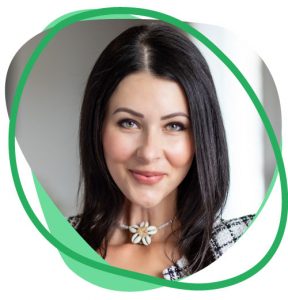“You have cancer, and we will have to remove your voice box, or you will not live to see your 19th birthday.”
When my oncologist first said these words I laughed, thinking it was all a big joke. Turns out, it wasn’t.
I was diagnosed with Stage IV laryngeal cancer in 2006, at the age of 18. I had surgery to remove my voice box (larynx), thyroid, and surrounding lymph nodes, followed by chemoradiation.
The treatments worked, but the aftermath was devastating. I was left to live with a permanent disability: a tracheotomy and only able to speak with a soft whisper for a voice.

Physically, I recovered well, but my mental health suffered greatly, and I developed severe depression and post-traumatic stress disorder (PTSD).
For several years I suffered, not knowing where I fit in this world or what I was supposed to do with my second chance at life. You see, that’s the thing about cancer people don’t tell you; you don’t just get to go back to who you were. It takes a part of you. Maybe it’s your voice, or fertility, or a limb, or your life. Either way, you don’t come through the other side the same.
There was little psychosocial support available at the time, and eventually I realized no one was coming to save me from my life. I had to make a choice: I could leverage my experience to create change, or I could be the victim of my story and wallow.
The words of psychologist Dr. Carl Jung became my mantra: “I am not what happened to me. I am what I choose to become”. I realized that despite the hardships life dealt me, I still have the opportunity to decide how I choose to respond. That led me to a career in cancer research focused on psychosocial supportive care for people with cancer.
Our research focuses on using integrative medicine modalities, such as yoga, mindfulness, probiotics, and other therapies to support people affected by cancer. Through my research and patient advocacy work, I’m passionate about helping others with cancer to not only survive, but thrive!
Cancer research changed my life by giving my experience purpose and allowing me to help others affected by this disease. The huge advancements in cancer therapies, like immunotherapy, have also been a blessing for my younger sister, who is currently navigating her own cancer experience. With the advancements from cancer research, we have been able to access precision oncology solutions to address her tough-to-treat neuroendocrine tumour, and I’m hopeful we will soon find the solution to cure her cancer once and for all.
I think that’s one of the most important gifts cancer research gives us: HOPE! We know that when patients lose hope, their outcomes are poor. With these continuous advancements in precision oncology, we have hope that the right solution is out there — that a brighter future exists.
Dr. Julie Deleemans is a Canadian Institutes for Health Research (CIHR) funded Postdoctoral Fellow at the University of Calgary in the Department of Oncology, and a 19-year survivor of stage IV laryngeal cancer. She is an experienced patient advocate and lead researcher on the Chemo-Gut Probiotic Trial (www.chemogut.ca). Through her research and advocacy, she’s passionate about helping others affected by cancer.
